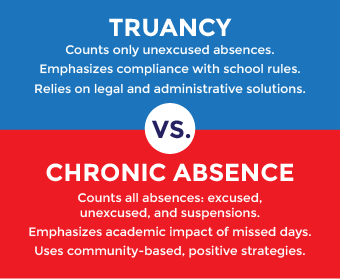 Chronic absence is defined as missing 10 percent or greater of the total number of days enrolled during the school year for any reason. It includes both excused, unexcused, out-of-school suspensions, and in-school suspensions that last more than one-half of the school day.
Chronic absence is defined as missing 10 percent or greater of the total number of days enrolled during the school year for any reason. It includes both excused, unexcused, out-of-school suspensions, and in-school suspensions that last more than one-half of the school day.
Chronic absenteeism means missing too much school—for any reason—excused or unexcused. Experts and a growing number of states define chronic absenteeism as missing 10% (or around 18 days) during a school year).
Students are chronically absent for many reasons. There are some reasons for absenteeism that cannot be avoided. Life happens. Common illness causing high fevers and fatigue happen. But, if your child is missing many days of school, or a few days every single month, it’s important to consider the reason for the absenteeism.
- A nationwide study found that kids with ADHD, autism, or developmental delays are twice as likely to be chronically absent compared to kids without these conditions.
- Children with common chronic illnesses, such as asthma and type 1 diabetes, miss more school when they are having more symptoms.
- Mental health conditions, like anxiety or depression, are common reasons for absences.
- Up to 5% of children have school-related anxiety and may create reasons why they should not go or outright refuse to attend school.
Add it all up, and this creates a lot of empty desks and missed school time.
Missing just two days a month of school―for any reason― can be a problem for kids in a number of ways. Children who are chronically absent in kindergarten and first grade are less likely to read on grade level by the third grade. For older students, being chronically absent is strongly associated with failing at school―even more than low grades or test scores. When absences add up, these students are more likely to be suspended and drop out of high school. Chronic absenteeism is also linked with teen substance use, as well as poor health as adults.
10 PRACTICAL TIPS TO GETTING YOUR CHILD TO SCHOOL ON TIME, EVERY DAY
- Set attendance goals with your child and track your child’s attendance on a calendar. Try offering small rewards for not missing any school, such as a later bedtime on weekends.
- Help your child get a good night’s sleep. A lack of sleep is associated with lower school achievement starting in middle school, as well as higher numbers of missed school and tardiness. Most younger children need 10-12 hours per night and adolescents (13-18 years of age) need 8-10 hours per night.
- Prep the night before to streamline your morning. Lay out your child’s clothes. Pack backpacks and lunches. Develop back-up plans for getting to school if something comes up like a missed bus or an early meeting. Have a family member, a neighbor, or another trusted adult on standby to take your child to school should you ever need help.
- Try to schedule dental or medical appointments before or after school hours. If children have to miss school for medical appointments, have them return immediately afterward so they do not miss the entire day.
- Schedule extended trips during school breaks. This helps your child stay caught up in school learning and sets the expectation for your child to be in school during the school year. Even in elementary school, missing a week of classes can set your child behind on learning.
- Don’t let your child stay home unless he or she is truly sick. Reasons to keep your child home from school include a temperature greater than 101 degrees, vomiting, diarrhea, a hacking cough, or a toothache. Keep in mind, complaints of frequent stomachaches or headaches can be a sign of anxiety and may not be a reason to stay home.
- Talk with your child about the reasons why he or she does not want to go to school. School-related anxiety can lead to school avoidance. Talk to your child about their symptoms and try to get them to talk about any emotional struggles they may have with issues like bullying, fear of failure, or actual physical harm. If you are concerned about your child’s mental health, talk with your pediatrician, your child’s teacher, or school counselor.
- If your child has a chronic health issue such as asthma, allergies, or seizures, talk with your pediatrician about developing a school action plan. Meet with and get to know the nurse at your child’s school. If you need guidance and documentation for an Individualized Education Program (IEP) or 504 Plan, ask for your pediatrician’s help accessing services at school.
- Follow the rules. Be sure you know what your school’s requirements are for when your child will be absent or late. If you are supposed to call, email, or provide a doctor’s note after a certain number of days out, then do it.
- Keep track of your child’s attendance and investigate reasons when the days missed add up. Look into why your child is absent. Think about your child’s mood. Have they been spending time by themself lately? Is their chronic condition starting to be more problematic?
For more information: https://www.healthychildren.org/English/ages-stages/gradeschool/school/Pages/School-Attendance-Truancy-Chronic-Absenteeism.aspx